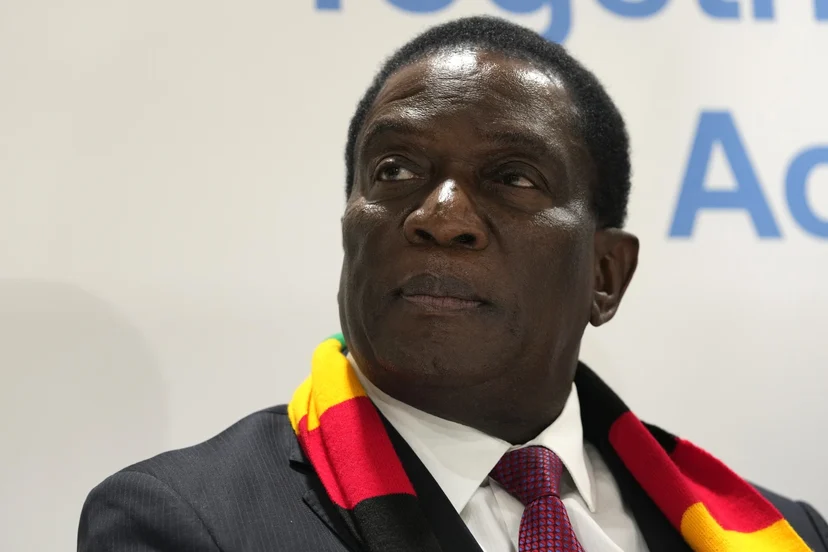- Featured
- No Comment
Speculation grows about a ‘Mnangagwa third term’ – ahead vote for second one

By Agencies
President Emmerson Mnangagwa is slated to pursue a second five-year term in this week’s elections. According to the constitution, this term should mark his final one.
However, a portion of his supporters has already begun advocating for a constitutional change that would permit him to seek a third term—an idea to which he appears somewhat open.
In July, during a gathering of a Christian sect that supports him, Mnangagwa made a statement implying that continuous rule could be achieved through prayers at church.
This remark reinforced the perception that the transformation he promised when he took over from long-standing authoritarian leader Robert Mugabe six years ago has not materialized.
Sections of the ruling ZANU-PF party, including the youth and women’s wings, have also called for a constitutional amendment to extend his rule beyond the prescribed two terms.
This situation represents a significant shift for the 80-year-old leader.
After being considered a potential successor to Mugabe for years, Mnangagwa faced a period of exile when Mugabe appeared to be grooming his wife for succession in 2017.
Mnangagwa returned after a popular coup later that year, vowing to depart from Mugabe’s repressive and isolationist rule.
Political analysts have noted that he is not so different from his predecessor.
“You have someone who has been a political understudy of Robert Mugabe so all the negative things you can talk about Zimbabwean politics, Mnagangwa has grown up with that system and so now that he is in power and he has the military behind him, he is going to use those bad, same tactics to hold onto and remain in power,” said Edgar Githua, an International Relations, Conflict and Diplomacy expert at United States International University-Africa. “He will weaponize anything to remain in power,” he added.
Dubbed “the Crocodile,” Mnangagwa was previously associated with enforcing Mugabe’s tough actions.
These actions included the North Korean-trained military brigade’s 1980s massacre of around 20,000 Ndebele ethnic minority individuals in the Matabeleland region while Mnangagwa served as security minister.
He was also linked to a violent crackdown on the opposition following Mugabe’s loss to opposition leader Morgan Tsvangirai in 2008.
Despite this history, Mnangagwa initiated discussions about these past atrocities after becoming president and aimed to differentiate his administration from Mugabe’s.
He made promises of compensating displaced white farmers, abolished a law mandating foreign business ownership be ceded to locals, and advocated for democracy.
He sought to restore relationships with Western countries, even applying for Zimbabwe’s reentry into the Commonwealth and engaging with international forums like the World Economic Forum.
Although some questioned whether Mnangagwa’s rule would be different from the past, he managed to charm Western nations and investors.
Even the opposition, once critical of the ruling party showed some support by attending his inauguration.
Despite Mnangagwa’s appeals during campaigns, economic challenges and an active opposition led him to adopt old strategies for maintaining power, as suggested by human rights groups and analysts.
According to Alexander Rusero, a political analyst, the political elite in ZANU-PF consider Zimbabwe as their property and would resort to violence whenever threatened.
He says that Mnagangwa is not a novice to Zimbabwean politics since he has been on the scene for 55 years and this is just a continuation of Mugabe’s rule.
“The hardliner stance that existed during Mugabe is still there because it is a system. It is not vested more in personalities but is a culture. It is only unfortunate that Mugabe was there for 37 years but because it is a system it is still living more perfected to this day even in the absence of Mugabe. So if Mnagangwa is out of power today and ZANU-PF remains, that kind of system is likely going to remain,” he said.
Amid economic struggles and allegations of political oppression, as has been pointed out in reports by Amnesty International and Human Rights Watch, Mnangagwa’s relationship with the West deteriorated.
The U.S. and European Union maintained sanctions, asserting that substantial changes hadn’t occurred to warrant lifting them.
Mnangagwa, seeking support from non-Western allies, cultivated relationships with leaders like Belarus’ and Iran’s presidents, China’s Xi Jinping, and Russia’s Vladimir Putin. This approach mirrors Mugabe’s pivot to alternative alliances after Western isolation.
Despite these dynamics, analysts like Rusero acknowledge that there has been some hint of changes that show some contrast from Mugabe’s rule with the exception of having the need to cling to power.
“There are also certain things that have shifted especially a reconciliatory and less confrontational tone. Mugabe was known for his confrontational rhetoric ‘Keep your Britain I will keep my Zimbabwe, Zimbabwe will never be a colony’ and even reducing a whole election into an anti-Blair election. So that kind of rhetoric is no longer there,” Rusero said.
“Mnagangwa is minding his own business of consolidating power more than quarreling at the global political stage as was the case with Mugabe,” he added.
